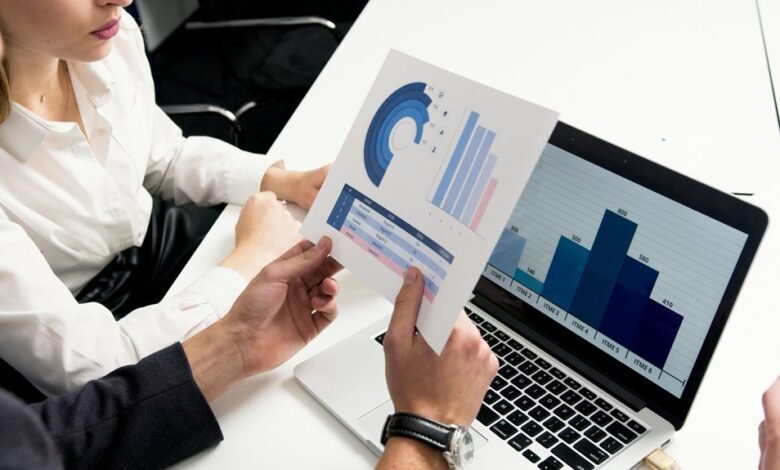50 Top Picks for Growth in 2025

The landscape of 2025 presents a dynamic array of growth opportunities driven by technological and societal shifts. Key sectors such as AI, quantum computing, renewable energy, and autonomous systems are poised for exponential advancement. These innovations promise to reshape industries and redefine global competitiveness. Understanding these trends is crucial for strategic planning and investment. The following insights highlight the most promising areas that could influence economic and social trajectories in the coming years.
Artificial Intelligence and Machine Learning
How will artificial intelligence and machine learning shape the economic and technological landscape in 2025? Anticipated advancements hinge on addressing AI ethics and machine learning bias, ensuring equitable decision-making.
A future driven by transparent algorithms offers freedom from systemic constraints, fostering innovation and trust. Data-driven policies will be essential to mitigate bias and maximize AI’s societal benefits.
Quantum Computing
Quantum computing is poised to revolutionize the technological landscape by exponentially increasing processing capabilities, enabling solutions to complex problems beyond classical reach.
Advancements in quantum entanglement and qubit stability are critical, promising more reliable, scalable systems. This evolution offers unprecedented freedom in data analysis, optimization, and innovation, shaping future breakthroughs across industries.
Renewable Energy Technologies
Renewable energy technologies are set to play a pivotal role in the global transition toward sustainable power generation by 2025. Advances in solar panels and wind turbines are projected to significantly increase efficiency and capacity, driven by declining costs and innovative designs.
This evolution empowers individuals seeking energy independence, fostering a future where clean, affordable power aligns with the desire for freedom.
Electric Vehicle Expansion
The expansion of electric vehicles (EVs) by 2025 is expected to be driven by advancements in battery technology, infrastructure deployment, and policy support, resulting in a significant shift in transportation dynamics.
Growth hinges on expanding charging infrastructure and implementing efficient battery recycling processes, empowering consumers with sustainable, accessible freedom, while reducing ecological impact and ensuring long-term viability of EV ecosystems.
Autonomous Transportation
Autonomous transportation is poised to fundamentally reshape mobility systems by 2025, driven by rapid advancements in artificial intelligence, sensor technologies, and vehicle connectivity.
This evolution will optimize urban planning and traffic management, offering unprecedented freedom through efficient, adaptive routing.
Data-driven insights suggest autonomous systems will reduce congestion, enhance safety, and enable more flexible, accessible urban mobility for all users.
5G and Beyond Connectivity
G and beyond connectivity represents the next frontier in digital communication, expanding current 5G networks to support space habitats and cosmic exploration. This evolution enables real-time data exchange across vast distances, fostering autonomous systems and resilient infrastructure.
Data-driven and future-focused, it empowers individuals seeking freedom to explore cosmic frontiers while ensuring seamless connectivity in extreme environments.
Internet of Things (IoT) Innovations
Advancements in IoT are poised to significantly enhance smart home systems, enabling seamless automation and improved energy efficiency through integrated device networks.
Simultaneously, industrial IoT innovations are expected to drive operational efficiencies and predictive maintenance, supported by increasing data analytics capabilities.
These developments are projected to accelerate the adoption of IoT solutions across consumer and enterprise sectors, fostering substantial market growth by 2025.
Smart Home Integration
As the Internet of Things (IoT) continues to evolve, smart home integration emerges as a critical driver of technological growth in 2025. This growth is driven by increasing consumer demand for seamless automation and energy efficiency.
Voice control systems enhance user freedom, optimizing energy use and allowing effortless management.
This convergence fosters a future where autonomous, efficient, and personalized living environments become standard.
Industrial IoT Advancements
The evolution of Industrial IoT (IIoT) is poised to transform manufacturing, supply chain management, and asset monitoring through the integration of advanced sensor technologies, machine learning, and real-time data analytics.
Industrial IoT sensors will enable more autonomous factory automation, empowering industries with data-driven decision-making and enhanced operational agility.
This transformation will foster greater innovation and operational freedom in manufacturing processes.
Blockchain and Decentralized Finance
Advancements in blockchain security are anticipated to underpin the expanding DeFi ecosystem, with multi-layered protocols reducing vulnerabilities.
Data indicates that DeFi adoption is projected to increase at a compound annual growth rate of over 40% through 2025, driven by institutional interest and regulatory clarity.
These trends suggest that enhanced security measures will be critical in sustaining user trust and mainstream integration of decentralized financial services.
Blockchain Security Advances
Blockchain security is poised to undergo significant transformation by 2025, driven by the integration of advanced cryptographic protocols and automated threat detection systems.
These innovations enhance resilience and transparency, empowering users to exercise greater control over their assets.
Data-driven security improvements will reduce vulnerabilities, fostering an environment where blockchain security strengthens, enabling freer and more secure decentralized financial ecosystems.
DeFi Adoption Trends
Will decentralized finance (DeFi) continue its rapid adoption trajectory into 2025, or will regulatory and technological hurdles slow progress?
Data indicates growing interest in decentralized staking and yield farming, empowering individuals to optimize returns independently.
Future trends suggest increased autonomy and innovation, but scalability and compliance challenges may impact the pace of widespread DeFi integration into the financial landscape.
Cybersecurity Solutions
Cybersecurity solutions are poised to become increasingly vital in 2025 as digital infrastructure expands and attack vectors evolve. Advanced threat detection and phishing prevention technologies will empower organizations to proactively defend their systems.
Data-driven insights will enable flexible security architectures, fostering autonomous protection and ensuring digital freedom remains uncompromised amidst growing cyber threats.
Biotechnology Breakthroughs
Advancements in biotechnology are expected to drive significant innovations in healthcare and agriculture by 2025, fueled by breakthroughs in gene editing, regenerative medicine, and synthetic biology.
These developments challenge biotech ethics and demand careful regulation to balance progress with societal freedoms.
Data-driven insights highlight the potential for transformative solutions, emphasizing the importance of responsible innovation in shaping future biotech landscapes.
Personalized Medicine
By 2025, personalized medicine is poised to significantly transform healthcare through the integration of genomic data, advanced diagnostics, and tailored treatment protocols.
Advances in genetic tailoring and biomarker discovery will enable more precise interventions, empowering individuals with data-driven choices.
This evolution fosters autonomy, unlocking a future where healthcare adapts seamlessly to each person’s unique genetic profile.
Telehealth and Remote Care
Telehealth and remote care are anticipated to become integral components of healthcare delivery by 2025, driven by innovations in digital infrastructure, wearable health technologies, and artificial intelligence.
These advancements will enhance virtual health platforms, fostering increased patient engagement and autonomy.
Data-driven insights suggest that expanding access and personalized virtual services will redefine healthcare freedom and accessibility in the future landscape.
Sustainable Agriculture Technologies
As concerns over climate change and resource depletion intensify, sustainable agriculture technologies are increasingly viewed as essential for ensuring food security and environmental resilience by 2025.
Innovations promoting crop diversity and soil health optimize resource use, enhance resilience, and reduce dependency on chemical inputs.
These data-driven approaches empower farmers to sustain ecological balance while maintaining productivity and independence.
Vertical Farming and Urban Agriculture
Vertical farming and urban agriculture are emerging as critical solutions to counteract urban land scarcity and meet the increasing demand for fresh produce within city environments. These methods enhance urban sustainability and enable crop diversification.
They empower individuals to pursue food independence. Data indicates significant growth potential, fostering a future where urban residents enjoy greater control over their food sources and choices.
Smart Home Devices and Automation
Advancements in connectivity protocols are expected to significantly enhance the interoperability of smart home devices, facilitating seamless user experiences.
Simultaneously, the integration of intelligent security solutions is projected to improve threat detection and response times, driven by AI and sensor data analytics.
These developments are poised to accelerate the adoption of automation systems, shaping the future landscape of residential technology.
Enhanced Connectivity Features
Enhanced connectivity features in smart home devices and automation systems are poised to drive significant growth in 2025, underpinned by increased adoption of integrated IoT ecosystems.
Innovations such as wireless charging and holographic displays will enable seamless user freedom, facilitating more intuitive interactions and expanding control options.
This evolution signals a future where connectivity empowers autonomous, immersive living environments.
Intelligent Security Solutions
Intelligent security solutions in smart home devices and automation are expected to experience accelerated growth in 2025, driven by advancements in AI-powered monitoring, real-time data analysis, and adaptive threat detection.
These innovations prioritize privacy enhancement while enabling users to maintain autonomy. Future systems will empower individuals with enhanced threat detection capabilities, fostering greater freedom through secure, responsive, and privacy-conscious automation.
Digital Payment Systems and Fintech
Digital payment systems and fintech continue to drive transformative shifts in global financial ecosystems, with projections indicating rapid adoption and innovation through 2025.
Emphasis on cryptocurrency regulation ensures legal clarity, while advancements in digital wallet security enhance user sovereignty.
These developments empower individuals seeking financial freedom, fostering a more inclusive, secure, and adaptable payment landscape driven by data-driven innovation.
Cloud Computing Advancements
Emerging trends in cloud computing emphasize the integration of hybrid cloud environments, which are projected to constitute over 70% of enterprise cloud strategies by 2025. This integration enables greater flexibility and scalability.
Concurrently, advancements in AI-driven security protocols are anticipated to reduce incident response times by up to 60%, addressing evolving cyber threats.
These innovations are expected to significantly influence organizational agility and risk management capabilities in the near future.
Hybrid Cloud Integration
Hybrid cloud integration is poised to become a critical driver of enterprise agility and operational efficiency by 2025, as organizations increasingly seek seamless interoperability between on-premises infrastructure and multiple public cloud platforms.
Leveraging multi cloud strategies, businesses will gain flexibility and resilience, enabling innovation and competitive advantage.
This evolution underscores a future where control and freedom shape cloud ecosystems.
AI-Driven Cloud Security
By 2025, AI-driven cloud security systems are expected to significantly enhance threat detection, response times, and vulnerability management through advanced analytics and machine learning algorithms.
These innovations will improve privacy compliance and empower organizations to proactively identify risks, offering greater operational freedom.
Data-driven insights will enable adaptive security measures, fostering trust and resilience in dynamic cloud environments.
EdTech and Digital Learning Platforms
The landscape of EdTech and digital learning platforms is poised for substantial growth in 2025, driven by advancements in artificial intelligence, data analytics, and immersive technologies.
Future platforms will harness gamified assessments and interactive tutorials to foster personalized, engaging learning experiences, empowering users to pursue knowledge independently, supported by data-driven insights that optimize outcomes and expand educational freedom.
Virtual and Augmented Reality
Virtual and augmented reality technologies are projected to undergo significant advancement in 2025, driven by rapid improvements in hardware capabilities, computational power, and content development tools.
This evolution will empower creators and marketers alike, fostering virtual art innovations and augmented marketing strategies that enhance user engagement.
It will also offer unprecedented freedom to explore immersive experiences beyond traditional boundaries.
Gaming and Interactive Entertainment
Advancements in immersive virtual realities are poised to reshape user engagement, with projections indicating a 35% increase in adoption rates by 2025.
Cloud gaming is expected to expand its market share significantly, driven by improved latency and infrastructure.
Concurrently, AI-driven game design is anticipated to optimize content personalization and development efficiency, fueling innovation within the industry.
Immersive Virtual Realities
Immersive virtual realities are poised to redefine gaming and interactive entertainment landscapes by leveraging cutting-edge technologies such as haptic feedback, real-time rendering, and spatial audio. These advancements will enhance virtual worlds, offering unprecedented sensory immersion.
Future growth depends on user-centric design, empowering individuals to explore digital realms freely, transforming entertainment into a personalized, boundaryless experience driven by data-driven innovation.
Cloud Gaming Expansion
The expansion of cloud gaming is anticipated to significantly reshape the interactive entertainment industry by enabling seamless access to high-quality games across diverse devices without the need for specialized hardware.
This cloud gaming expansion fosters immersive gameplay, offering users greater freedom to explore dynamic, data-driven experiences anytime, anywhere.
Thus, it accelerates the democratization and evolution of gaming ecosystems.
AI-Driven Game Design
AI-driven game design is poised to revolutionize the interactive entertainment industry by enabling the creation of highly personalized and adaptive gaming experiences. Leveraging AI powered storytelling and procedural content generation, developers can craft dynamic narratives and worlds that respond to player choices, fostering freedom and immersion.
This data-driven approach promises unprecedented innovation and engagement in gaming’s future landscape.
Cryptocurrency Adoption
Will the widespread integration of cryptocurrencies into mainstream financial systems accelerate by 2025? Data indicates rising adoption through decentralized exchanges and token staking, fostering user autonomy.
Increased liquidity and security features suggest a future where crypto empowers individuals, reducing reliance on traditional banks. This growth signals a shift toward a more liberated, transparent financial landscape driven by technological innovation.
Space Exploration and Commercialization
The expansion of private space missions and the proliferation of space tourism are expected to significantly influence the commercial space sector by 2025.
Market projections indicate a compound annual growth rate (CAGR) exceeding 20%, driven by technological advancements and decreasing launch costs.
These trends suggest increased accessibility and diversified revenue streams within space exploration endeavors.
Private Space Missions
Private space missions are poised to significantly accelerate the commercialization of space, driven by advances in propulsion technology, reduced launch costs, and increasing investment from private firms.
Enhanced mission planning capabilities enable agile, autonomous operations, empowering stakeholders to pursue their vision of freedom beyond Earth.
This data-driven shift signals a transformative era for private space, fostering innovation and expanding opportunities for independent exploration.
Space Tourism Expansion
Advancements in private space capabilities are catalyzing a substantial expansion of space tourism, transforming it from niche luxury to scalable commercial enterprise.
Future trajectories include lunar habitats and space hotels, offering unprecedented freedom to explore beyond Earth.
Data indicates rising demand for autonomous, immersive experiences, positioning space tourism as a key driver of human expansion into the cosmos.
Green Construction and Eco-Friendly Materials
Green construction practices and eco-friendly materials are poised to drive significant industry transformation by 2025. This shift is driven by increasing regulatory pressures, technological innovations, and shifting consumer preferences.
Emphasizing sustainable building and eco-friendly insulation, these trends enable architects and developers to optimize energy efficiency and reduce environmental impact.
This evolution fosters a future where construction aligns with ecological and economic freedom.
Circular Economy Initiatives
Advancements in recycling technologies and innovative material reuse are poised to accelerate circular economy efforts through 2025, supported by projected increases in processing efficiency and material recovery rates.
Data indicates that scalable recycling solutions could reduce waste generation by up to 30%, driving significant resource conservation.
These initiatives are expected to reshape supply chains, fostering sustainable manufacturing paradigms across multiple industries.
Recycling Technologies Expansion
The expansion of recycling technologies is poised to play a crucial role in advancing circular economy initiatives by 2025, driven by increasing investments and innovative process developments.
These advancements enhance waste reduction capabilities, enabling more efficient resource recovery. As a result, stakeholders gain greater control over material flows, fostering sustainable growth and reducing environmental impacts through data-driven, scalable solutions.
Innovative Material Reuse
Innovative material reuse strategies are increasingly central to circular economy initiatives, leveraging advanced technologies and design principles to maximize resource efficiency.
Future trends highlight biodegradable packaging and eco-conscious textiles, enabling industries to reduce waste and carbon footprints.
Data indicates a surge in scalable reuse models, empowering consumers and producers to embrace sustainable practices that foster environmental freedom and resilience.
Wearable Health Technologies
How will wearable health technologies reshape personal healthcare management by 2025? Advances in material innovation and fashion sustainability enable unobtrusive, customizable devices that promote health awareness without sacrificing aesthetic freedom.
These innovations foster user empowerment, integrating seamlessly into lifestyles while emphasizing eco-conscious design, thus transforming health monitoring into a sustainable, expressive form of personal autonomy.
Data Analytics and Big Data
By 2025, advancements in data analytics and big data are expected to fundamentally transform decision-making processes across industries, driven by the exponential growth of interconnected devices and real-time data streams. Predictive modeling and data visualization will enable organizations to unlock insights, foster strategic agility, and empower users with the freedom to innovate without constraints, shaping a future of informed independence.
Edge Computing Solutions
As data generation continues to accelerate through interconnected devices and real-time streams, the limitations of centralized processing become increasingly apparent.
Edge computing solutions, emphasizing edge analytics and data sovereignty, empower organizations to process data locally, enhancing security, reducing latency, and fostering greater control.
This shift is pivotal for future-proofing data-driven strategies with increased autonomy and resilience.
AI-Driven Customer Experience Tools
What role will AI-driven customer experience tools play in shaping the competitive landscape of 2025? They will enable personalized interactions through advanced voice assistants and real-time analysis of customer feedback, empowering businesses to proactively address needs.
Data-driven insights will foster autonomous decision-making, offering consumers increased freedom while driving loyalty and differentiation in an increasingly competitive market.
Robotic Process Automation (RPA)
Robotic Process Automation is projected to significantly boost operational efficiency and accuracy by automating routine tasks across industries.
Data indicates that organizations implementing RPA experience reductions in processing time and error rates, leading to cost savings and improved compliance.
As adoption accelerates, RPA is poised to become a foundational element of scalable, future-proof workflows.
Enhancing Efficiency and Accuracy
Implementing Robotic Process Automation (RPA) is poised to significantly elevate operational efficiency and accuracy across industries by minimizing human error and accelerating repetitive tasks.
RPA enhances data accuracy and workflow optimization, empowering organizations with precise insights and streamlined processes.
This future-focused approach offers increased agility, enabling decision-makers to harness reliable data for strategic growth and operational freedom.
Automating Routine Tasks
Automating routine tasks through Robotic Process Automation (RPA) significantly enhances operational scalability by enabling organizations to reallocate human resources toward higher-value activities. This advancement drives workflow optimization and task automation, empowering businesses to achieve greater agility.
Future-focused, data-driven strategies harness RPA’s potential to unlock efficiencies, fostering a landscape where operational freedom and strategic innovation thrive.
Sustainable Packaging Innovations
As consumer demand for environmentally responsible practices continues to rise, innovations in sustainable packaging are emerging as critical drivers of corporate strategy and market differentiation.
Biodegradable plastics and eco-conscious fashion initiatives are shaping future trends, offering businesses the agility to meet sustainability goals while appealing to consumers seeking freedom from environmental guilt.
This shift fosters a more resilient, transparent supply chain.
Eco-Conscious Fashion and Textiles
Emerging trends in eco-conscious fashion emphasize breakthroughs in sustainable materials, driven by advances in bio-based fibers and recycled textiles.
Concurrently, increased transparency and accountability in supply chains are shaping consumer preferences and regulatory landscapes.
These developments are poised to significantly influence industry growth trajectories toward 2025.
Sustainable Materials Innovation
Innovations in sustainable materials are poised to revolutionize eco-conscious fashion and textiles by 2025, driven by advancements in bio-based fibers, recycled textiles, and environmentally friendly processing techniques.
These developments catalyze growth in eco-friendly textiles and biodegradable packaging, offering consumers and designers sustainable freedom through materials that reduce environmental impact while maintaining high-performance standards.
Ethical Supply Chain Practices
How will the integration of transparent and traceable supply chain practices shape the future of eco-conscious fashion and textiles by 2025? Enhanced data-driven systems enable sustainable sourcing and ensure fair labor, empowering consumers to make informed choices.
This shift fosters ethical accountability, reducing exploitation and promoting freedom in sustainable fashion, aligning industry growth with social responsibility and environmental integrity.
Autonomous Drones and Delivery Systems
What role will autonomous drones and delivery systems play in shaping logistical networks by 2025? They will enable unprecedented efficiency, reducing delivery times and expanding reach globally. Data-driven insights predict mass adoption, empowering consumers with greater freedom of choice.
These autonomous solutions will optimize supply chains, fostering agility and resilience while transforming traditional logistics into dynamic, autonomous ecosystems.
Mental Health Tech Solutions
By 2025, mental health technology solutions are poised to fundamentally transform access to psychological care through advanced digital platforms, AI-powered diagnostics, and personalized intervention tools.
Therapy apps and guided mindfulness exercises will empower individuals with greater autonomy, enabling data-driven, scalable support that fosters mental wellness, reducing barriers and expanding freedom in managing mental health independently.
Digital Identity Verification
Digital identity verification is anticipated to become a cornerstone of secure online interactions by 2025, driven by advancements in biometric authentication, blockchain, and AI algorithms.
These innovations will enhance the digital identity ecosystem, empowering individuals with greater control over their data.
This evolution offers increased freedom through seamless, reliable verification, reducing fraud while fostering trust in digital transactions.
Advanced Manufacturing and 3D Printing
Advancements in material science are enabling the development of stronger, more versatile components for additive manufacturing, enhancing product performance and sustainability.
Concurrently, automation and process optimization are significantly reducing production cycle times and operational costs in 3D printing workflows.
These technological synergies are poised to accelerate manufacturing innovation, driving scalable growth through increased efficiency and expanded application horizons.
Innovations in Material Science
Innovations in material science, particularly in advanced manufacturing and 3D printing, are poised to revolutionize production paradigms by enabling the creation of complex, lightweight, and highly customizable components.
Emerging biodegradable composites and nanostructured alloys promise sustainable, high-performance solutions that empower industry leaders to push boundaries, fostering innovation and freedom in design and manufacturing.
Automation and Process Optimization
The integration of automation and process optimization within advanced manufacturing and 3D printing technologies is transforming production efficiency and precision at an unprecedented rate.
Workflow automation and process streamlining enable manufacturers to unlock greater scalability and flexibility, empowering innovators to pursue freedom through optimized operations.
Data-driven insights drive continuous improvement, positioning these technologies as catalysts for sustainable growth in 2025.
Quantum Cryptography
Quantum cryptography is poised to revolutionize data security by leveraging the principles of quantum mechanics to achieve theoretically unbreakable encryption. Quantum encryption promises enhanced freedom from cyber threats, enabling organizations to protect sensitive information with unmatched robustness.
As adoption accelerates, quantum cryptography will shape the future landscape, empowering individuals and institutions with secure, unassailable communication channels.
Biodegradable Plastics and Materials
Biodegradable plastics and materials are increasingly regarded as critical solutions to mitigate environmental pollution caused by traditional plastics, which persist in ecosystems for centuries.
Future growth in eco-friendly packaging relies on innovations in biodegradable plastics, driven by data indicating reduced landfill impact and consumer demand for sustainable options.
This shift empowers industries and individuals seeking environmental freedom through responsible material choices.
Smart Cities and Urban Infrastructure
Advancements in smart city technologies are poised to revolutionize urban infrastructure by enhancing efficiency, sustainability, and quality of life. Data-driven urban planning will prioritize citizen engagement, fostering autonomous decision-making and freedom.
These innovations enable adaptable, resilient cities where residents actively shape their environments, ensuring infrastructure aligns with evolving needs and promotes sustainable urban growth.
Next-Generation Battery Technologies
Advancements in solid-state batteries are poised to significantly enhance energy density and safety profiles. With projections indicating market penetration by 2025, these innovations are expected to reduce reliance on rare materials while improving longevity, aligning with sustainability goals.
As a result, next-generation batteries could redefine energy storage paradigms across multiple industries.
Solid-State Battery Breakthroughs
Solid-state batteries represent a pivotal innovation in next-generation energy storage, promising significant improvements in safety, energy density, and longevity over traditional lithium-ion systems.
Driven by advanced battery innovation, solid state batteries enable greater freedom through faster charging and enhanced durability.
As research advances, these breakthroughs could redefine energy independence, unlocking new possibilities for power-hungry applications and sustainable mobility.
Sustainable Energy Storage
Emerging next-generation battery technologies are poised to transform sustainable energy storage by offering higher efficiency, reduced environmental impact, and enhanced scalability. These innovations could seamlessly integrate solar panels with energy grids, empowering individuals to harness and share renewable power freely.
Data-driven advancements promise a future where energy independence is accessible, flexible, and resilient across decentralized systems.
Social Media and Influencer Marketing Platforms
How will social media and influencer marketing platforms evolve to meet the increasing demand for targeted, measurable engagement by 2025?
Data indicates micro influencer campaigns and refined hashtag strategies will drive personalization and transparency, empowering brands to reach niche audiences effectively.
Future platforms will prioritize analytics-driven tools, enabling creators and consumers to foster authentic, measurable connections aligned with individual freedom.
Voice Recognition and Natural Language Processing
Advancements in social media and influencer marketing are increasingly leveraging voice recognition and natural language processing (NLP) technologies to enhance user interaction and personalization.
Future developments in voice command and speech analysis promise greater autonomy, enabling users to control platforms seamlessly.
Data-driven insights suggest these innovations will revolutionize engagement, fostering a more liberated, intuitive digital experience aligned with individual preferences.
Cyber-Physical Systems in Industry 4.0
What role do cyber-physical systems (CPS) play in shaping the evolution of Industry 4.0, and how will their integration influence manufacturing efficiency and adaptability?
Cyber-physical integration advances industrial automation, enabling real-time data exchange and predictive analytics. This transformation fosters autonomous decision-making, optimizing processes, reducing downtime, and empowering industries to operate with greater freedom and resilience in a dynamic market landscape.
Personalized Learning Algorithms
Personalized learning algorithms are transforming educational paradigms by leveraging data-driven insights to tailor instructional content to individual learner profiles. Through adaptive curricula and advanced learner analytics, these algorithms enable flexible, autonomous educational experiences, empowering learners to direct their growth.
This future-focused approach fosters freedom in learning pathways, optimizing engagement and mastery through precise, personalized interventions.
Ethical AI Development
As educational systems increasingly rely on sophisticated algorithms to customize learning experiences, ensuring the ethical development of AI becomes paramount.
Prioritizing algorithm transparency and bias mitigation fosters trust and fairness, empowering individuals to challenge and shape AI systems.
Future growth hinges on open, accountable frameworks that uphold autonomy and promote equitable access within a data-driven landscape.
Resilient Supply Chain Technologies
Resilient supply chain technologies are increasingly integral to maintaining operational continuity amid global disruptions. Data-driven innovations enhance supply chain resilience by enabling real-time logistics optimization, reducing risks, and increasing flexibility.
These advancements empower organizations to adapt swiftly, fostering operational freedom and competitive advantage in an uncertain future. Embracing such technologies is essential for sustained growth in 2025.
Digital Twins and Simulation Technologies
Advancements in digital twins are driven by the integration of real-time data streams, enabling dynamic updates and more accurate system modeling.
Virtual prototyping technologies are increasingly sophisticated, reducing development cycles and minimizing costly physical iterations.
These trends suggest a future where simulation-driven decision-making significantly enhances operational efficiency and innovation.
Real-Time Data Integration
Real-time data integration through digital twins and simulation technologies is poised to revolutionize operational efficiency and decision-making accuracy across industries.
Emphasizing real-time data synchronization, these systems power live analytics dashboards, enabling organizations to access immediate insights.
This advancement fosters a future of autonomous, data-driven operations where decision-makers enjoy greater freedom through rapid, precise information flows.
Virtual Prototyping Advances
The integration of digital twins and simulation technologies is transforming the prototyping landscape by enabling virtual testing environments that mirror real-world conditions with high fidelity.
These advances in virtual prototyping facilitate rapid iteration, empowering innovators to explore designs freely and optimize performance efficiently.
This data-driven approach accelerates development cycles, fostering a future where design freedom and precision coalesce seamlessly.
Nutrigenomics and Personalized Nutrition
As scientific understanding of genetic variation expands, nutrigenomics and personalized nutrition are positioned to transform dietary strategies by tailoring interventions to individual genetic profiles.
Leveraging nutrigenomics insights, future-focused data-driven approaches will empower individuals with personalized dietary strategies, fostering increased autonomy and informed choices.
Ultimately, this will enable a more liberated and optimized approach to health and wellness.
IoT in Healthcare
How will the integration of Internet of Things (IoT) technologies reshape healthcare delivery by 2025? IoT-driven remote patient monitoring and wearable diagnostics will enable personalized, data-rich insights, empowering individuals with autonomy over their health.
This evolution promises enhanced early detection, reduced hospitalization, and greater control, fostering a future where healthcare is more accessible, efficient, and aligned with personal freedom.
Cross-Industry Collaborations and Innovation Hubs
Growing integration across industries is accelerating the development of innovative healthcare solutions, driven by strategic cross-sector collaborations and the rise of dedicated innovation hubs.
These industry partnerships foster collaborative innovation, enabling rapid knowledge exchange and technological advancement.
As a result, future healthcare systems are poised for transformative growth, emphasizing agility, interconnectedness, and the continuous pursuit of disruptive breakthroughs.
Investment in Future-Focused Startups
Investing in future-focused startups is increasingly recognized as a critical driver of innovation and competitive advantage in the evolving technological landscape.
Data indicates a surge in cultural investment and social entrepreneurship, empowering autonomous growth and societal impact.
This strategic focus fosters disruptive solutions aligned with future market demands, enabling entrepreneurs to shape a more sustainable and liberated technological ecosystem.
Conclusion
The trajectory of 2025’s top growth sectors signals an unprecedented leap toward a hyper-connected, sustainable, and technologically empowered society. With exponential advancements in AI, quantum computing, and renewable energy, these innovations are poised to redefine human potential and ecological balance on a planetary scale. Data-driven insights suggest that industries embracing these transformative trends will catalyze economic upheavals and societal shifts, ultimately forging a future where technological evolution surpasses current imagination, unlocking possibilities once deemed science fiction.






